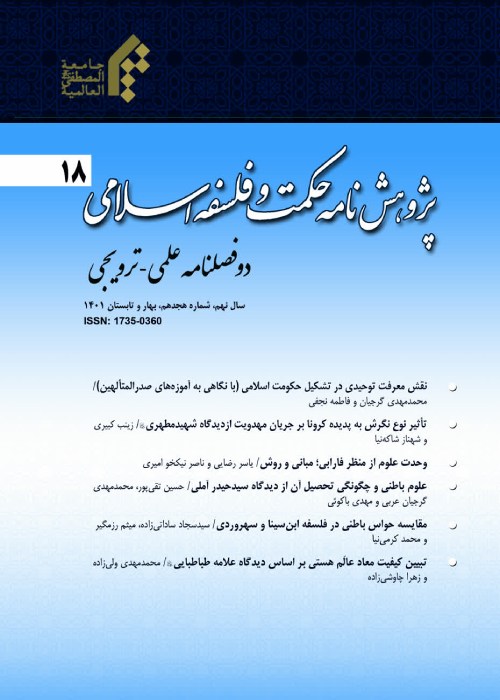فهرست مطالب
پژوهشنامه حکمت و فلسفه اسلامی
سال دوم شماره 7 (پاییز 1382)
- تاریخ انتشار: 1382/08/10
- تعداد عناوین: 11
-
صفحه 15
-
صفحه 111
-
صفحه 145
-
فوائد فقه مقارن / سخنرانی آیت الله مکارم شیرازی در همایش فقه مقارنصفحه 179
-
صفحه 185
-
صفحه 186
-
Page 2An independent research has not been performed about Alawites yet and the very negative presumption common between heresiography writers is considered right. This article besides regarding early heresiography writes and late non-Alawite author’s ideas has mentioned Alawite points too and lets us know how non-Alawite beliefs are wrong and paradoxical. This article reveals a very interesting point. There were two personalities between late and early non-Alawites who didn’t believe in the negative ideas about Alawites, due to having relationships with Alawites. Finally this article concludes that Alawites Shiites were who believed in fundamental principles such as unity, justice, prophet hood, Imamate, resurrection and so on.
-
Page 15Ismalism was welcomed in Afghanistan from the beginning and its activity reached its peak in the late 3rd A.H. Nasser Khosro played a very outstanding role in propagating Ismalism. He was preaching this religion as an authority in Balk and Badakhshan from 444 till 481. Badakhshan was safe from the mogul invasion since mountains covered it. Therefore, Badakhshan was a shelter for Ismalis and their documents. There isn’t much information about the new history of Afghan Ismalis. Generally, recent Afghan Ismalis have declined culturally and scientifically and have gone superstitious in their beliefs. Ismalis of today exaggerate about Imam Ali and their own Imams and believe in their resurrection and they are rightfully called “Ali-o-llahi”. They are not determined to legal divine rules. 3% of the Afghan population are Ismalis and they live in following areas: Badakhshan (majority), Kabul, Midan, Parvan, Baqlan, Samarqand, Zabol,Fariab,Balkh,Joozan,Qandehar
-
Page 36Most of honored jurists who were against blood transaction called it prohibited. Jurists narrations are as follows: A) Absolute prohibition; B) Distinguishing pure and impure blood; C) Independent prohibition; D) Transaction license for lawful profits. The proofs of jurists believed in prohibition are: A) Unanimity; B) Not owning the blood; C) Blood impurity; D) Contract impurity in principle; E) Helping a sin; F) Verses; G) Traditions. After considering these points, it seems nowadays that the blood transaction is allowed regarding its profits. Sunni jurists prohibited blood transaction by following proofs: A) Unanimity; B) Blood impurity; C) Not owning the blood Some Sunni jurists allowed blood transaction since it saved lives.
-
Page 58"Zekr" means keeping the thing and is the antonym of forgetting. This word is used in Quran for different seven meanings. Their meaning can be found by comparing. Adding “Ahl” to the word "zekr" makes it a new word. Shiite unanimous traditions believe "Ahl-e-zekr" are Muhammad’s descendants. There are fifteen assumptions about "Ahl-e-zekr" in Sunni references that can be considered as three main ones: Christian people, Quran Ommah, Muhammad’s descendents. Sunni traditions are divided into two groups: The proof of the first group comes from the companions and followers and the proof of the second comes from the prophet and his family such as Imam Ali, Imam Bagher and…. Therefore the second group is more rightful through the view point of Shiites.
-
Page 80The amount of blood money is one of the differences between Sunni and Shiite jurists. This article tries to analyze this matter. At first the meaning of blood money and its necessity is presented and then a table of different legal ideas is contributed. Shiite accepted tradition says that the blood money of a person equals a hundred camels. If this amount is going to be paid by money, the financial amount should equal the value of a hundred camels. Then Sunni proofs are analyzed and it becomes clear that there are no other reliable options. After considering some legal Sunni and Shiite legal ideas, we get that there is unanimity between Sunni and Shiite jurisprudence.


